Astellas Pharma is gearing up for the grand opening of a $70 million, 154,00-square-foot research hub in San Francisco to streamline the company’s infrastructure as it dives deeper into R&D for cancer and rare diseases.
The move is apt for Astellas — one of the largest pharmas in Japan — as it extends its reach into new modalities like gene therapies.
“Ten years ago, we didn’t work on gene therapies,” said Yoshi Shitaka, the company’s chief scientific officer. “Now we are expanding the modality scope beyond small molecules and biologics.”
Like many major pharma companies, Astellas has evolved with the industry’s shifting tides into more complicated and specialized therapeutics — a journey that’s led them to deliver a number of recent wins.
Last year was particularly fruitful, Shitaka said, pointing to a positive phase 3 readout for zolbetuximab, an investigational cancer therapy aimed at HER2-negative, CLDN18.2-positive tumors. CLDN18.2 has become a particularly sought-after target among drug developers, and the demonstration of progression-free survival for zolbetuximab in combo with chemotherapy has put Astellas at the front of the pack to receive an FDA nod for the first-in-class monoclonal antibody.
“Most gene therapy companies are outsourcing clinical trials and manufacturing [but we] made a decision to internalize it. That differentiates us.”

Yoshi Shitaka
Chief scientific officer, Astellas Pharma
But the company hit a snag in January when the regulatory agency rejected Astellas’ BLA due to “unresolved deficiencies” with a third-party manufacturer.
“We remain confident in zolbetuximab’s clinical profile and potential to fill a significant therapeutic gap for those diagnosed with advanced gastric or GEJ cancer whose tumors are CLDN18.2 positive,” Astellas’ senior vice president and head of immuno-oncology development, Moitreyee Chatterjee-Kishore, said in a release which noted that the rejection was not due to safety or efficacy reasons.
Astellas also made a splash in the women’s health space last May when its drug Veozah became the first NK3 receptor antagonist approved to treat hot flashes and night sweats in menopausal women.
Moving forward, Shitaka said the company’s pipeline development will focus on five core areas: immuno-oncology, gene therapy, targeted protein degradation, cell therapies and mitochondrial biology.
And through its bustling R&D efforts and a flurry of deals, Astellas is aiming to close any remaining holes in its development plans.
The gene factor
Astellas is looking beyond its cancer focus to forge into gene therapies, but the journey hasn’t all been smooth sailing.
In 2021, four patients died in a study testing its gene therapy AT132 for X-linked myotubular myopathy, a rare neuromuscular illness, prompting an FDA hold on the trial. Late last year, the company said an investigation found an underlying liver condition in the four patients and that it’s working with the agency to get the hold lifted.
Rather than being deterred, Astellas is leaning into its gene therapy plans. In addition to the new research hub in San Francisco, the company opened a large-scale gene therapy manufacturing facility in North Carolina in 2022.
“Most gene therapy companies are outsourcing clinical trials and manufacturing [but we] made a decision to internalize it,” Shitaka said. “That differentiates us.”
With these development plans in place, Shitaka said the remaining gaps Astellas wants to fill are related to technology capabilities — a challenge it’s tackling through partnerships.
In 2019, Astellas acquired Audentes Therapeutics, which handed the company AT132, alongside an AAV gene therapy technology platform and manufacturing know-how.
More recent deals are aimed at bolstering capabilities in the company’s other focus areas, such as its match-up with Cullgen, announced last year, which will advance R&D into targeted protein degraders.
On a personal level, Shitaka said he is focused on using emerging technologies to enhance drug development, especially after the company was able to shorten the optimization period for small molecule development from one and a half years to seven months using AI.
“I’d like to [advance a] new stage of the AI and digital transformation in the R&D process,” Shitaka said.
On a roll in oncology
While venturing into new areas like gene therapy, Astellas has continued to fuel its growth engine with blockbusters and innovative oncology treatments.
In November, the FDA signed off on a significant label extension for Xtandi, which Astellas developed with Pfizer, that made it the only androgen receptor inhibitor approved for patients with nonmetastatic castration-sensitive prostate cancer — and the only novel hormone therapy that treats three kinds of prostate cancer. The nod could elevate Xtandi, which pulled in about $5.9 billion in 2022, to the new standard-of-care option, the company said in a release.
April marked another oncology score when Astellas won an FDA nod for the antibody-drug conjugate enfortumab vedotin (sold under the brand name Padcev) it developed with Seagen to treat bladder cancer.
Later in the year, the companies also released results from a trial testing the ADC in combination with Merck & Co.’s Keytruda in urothelial cancer, which they called “groundbreaking” for achieving progression-free survival rates not previously seen in a “broad population of patients.”
“We got a standing ovation at ESMO,” Shitaka said of Astellas’ results presentation at the European Society of Medical Oncology meeting.
For its next oncology act, Astellas is advancing selective KRAS degraders leveraging targeted protein degradation technology for “aberrant proteins” in cancer once deemed undruggable. The company’s lead asset using targeted protein degradation, ASP3082, is in early-stage clinical trials for pancreatic, colorectal and lung cancers with the KRAS G12D mutation.
The race to bring KRAS-targeting drugs to market has intensified in recent years, and in 2021, Amgen got across the finish line first with an accelerated approval for non-small cell lung cancer.
But those drugs inhibit KRAS, Shitaka said, pointing out that the beauty of Astellas’ KRAS degraders is that they could trigger “fewer adverse events.” Proving the technology, he said, is a holy grail.




















